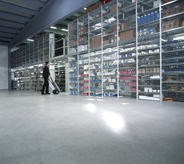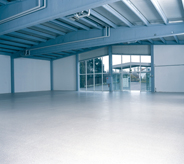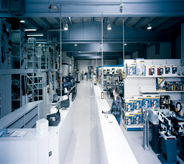Warehouse Flooring
Silikal® Nationwide Flooring- 888.830.1404
-

No flooring can be as tough as Silikal warehouse flooring, as forklifts are probably the most floor damaging items currently known to mar flooring but with Silikal there’s never damage.
Enlarge -

Imagine if you can a warehouse full of frozen foods, and then see if you can imagine how tough that warehouse flooring must be to take freezing temperatures and forklifts!
Enlarge -

All warehouse flooring must be able to take not only the pressures of heavy loads but frequently the punishment of fork lifts as well.
Enlarge
As you might expect, warehouse flooring is an animal unto its own. If you imagine a warehouse in your mind you will see pallet after pallet of goods stacked as far as the ceiling, and forklifts carrying terribly heavy loads zipping around in ways that remind one of a beehive. Most warehouses are indeed that busy, going from the warehouse to filling trucks that await the goods chosen so that they can go on their merry way delivering the merchandise to the stores that await them.
Even if you know nothing about warehouses, you know for a fact that a warehouse is no place for stick-on tiles or even ceramic tiles, for that would be a huge waste of energy and money. In addition you probably understand that the paint-on types of watery products may not even last a day in such an edifice.
Old substances must often first be removed from warehouse floors. That in itself might be very problematic as it may release asbestos or terrible complications that will have to be dealt with. The entry of solvents arrived into the picture, but they had their own complications such as the release of VOCs, Volatile Organic Compounds, into the air. Thus the solvents were not really a viable answer. Flooring installers went back to blasting, sanding, or grinding off the old flooring.
Thankfully much of this is flooring ancient history. Then along came polymer materials, called epoxies. They were laid as liquids, and then with the miracle of chemicals slowly converted into a solid. It was said that this would actually create a thoroughly nonporous as well as a “true” seamless installation. Little did most individuals in the general populace realize that unfortunately those floors create their own problems? Those problems entailed the formation of very minute pinholes. The pinholes began to disintegrate the flooring product until larger patches of disintegration appeared.
Given that these products had been installed in warehouses, when forklifts laden with goods passed over them, large patches of flooring were worn off, and eventually the flooring had to be replaced once more. Installers blamed the warehouse owners saying that surely they had not adhered to the warnings to let the floors cure for at least 24 or more hours, depending on the product. Warehouse owners retaliated by suing many flooring companies, who then came out and reapplied the same products, kept watch on the cure time, only to find to their dismay that the same problems occurred when the forklifts were allowed to resume their comings and goings.
At this point you will realize why Silikal is so often utilized in warehouses. There are no pinholes ever, and forklifts can resume their work one hour after installation of the flooring is complete. It is a warehouse owner’s dream come true.





 COLOR MIXING DESIGN TOOL
COLOR MIXING DESIGN TOOL
 COLOR CHARTS + BLENDS
COLOR CHARTS + BLENDS
 SAMPLE REQUEST
SAMPLE REQUEST

 Silikal®is manufactured + sold in conformity to
Silikal®is manufactured + sold in conformity to
 Avoid Costly Downtime
Avoid Costly Downtime